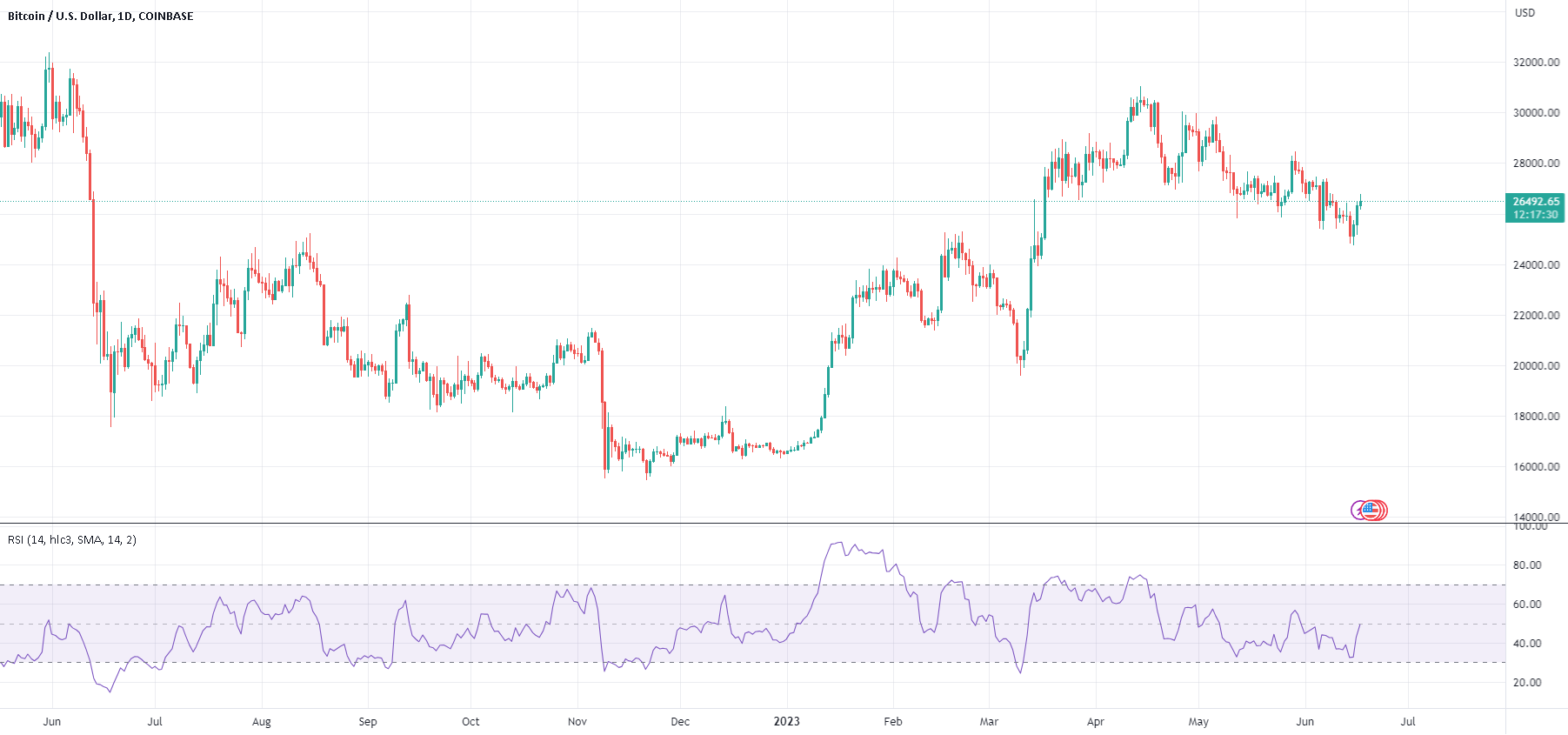 [](/u/BitcoinMacro/)
[](/u/BitcoinMacro/)
Crypto Regulation
[COINBASE:BTCUSD](/symbols/BTCUSD/)Bitcoin
The crypto industry is currently grappling with regulatory challenges and a rapidly evolving macro environment, making this a critical juncture in the history of digital finance.These challenges and opportunities come in the form of SEC lawsuits, global regulatory developments, and the potential introduction of a Bitcoin ETF.
SEC, Crypto, and the Regulatory Maze
The Securities and Exchange Commission (SEC) has recently faced criticism for its approach to regulating the crypto industry.Accused of ambiguity and procedural misconduct, the SEC’s actions have sparked widespread debate about the clarity of its regulatory stance.Many in the industry argue that this lack of clarity can undermine the legitimacy of lawsuits against crypto companies.
In a string of events, including a Financial Committee hearing on digital asset clarity and the reveal of Hinman’s email communications, we find evidence of an internal conflict within the SEC.Despite claims of clear regulatory rules by current Chair Gary Gensler, these occurrences suggest otherwise.
Adding to the intrigue is the SEC’s contrasting treatment of crypto companies.
Gemini, Coinbase, and Kraken face lawsuits for alleged non-compliance with securities laws, while Prometheum Inc.surprisingly receives approval.Amid these events, the crypto community is left cautiously optimistic yet uncertain of the future regulatory landscape.
U.S.Lags in Global Crypto Regulation
As the U.S.struggles with regulatory clarity, it risks falling behind its global counterparts in terms of financial innovation.
In Japan, MUFG Bank is setting a benchmark with its Yen-based stablecoin platform.The Bank of China has taken strides in utilizing blockchain technology, while the U.K.
government earns praise for its supportive stance towards decentralization.The European Union has also announced its Markets in Crypto-Assets (MiCA) legislation.Meanwhile, Hong Kong invites global virtual asset trading operators to explore developmental opportunities within its jurisdiction.
Given these international developments, many Republicans recognize that SEC’s current regulatory approach could jeopardize both U.S.influence in the global crypto market and its national security.Thus, they emphasize the need for a clear, reasonable framework for digital assets.
Market Liquidity and the SEC Fallout
The U.S.Securities and Exchange Commission’s (SEC) lawsuit against Coinbase and Binance.US has significantly decreased market depth and market share.
Traders and market makers have been fleeing the US, substantially reducing the aggregated market depth.The total market depth for the top 10 crypto tokens has seen a 20% drop since the beginning of 2023.
The falling liquidity in these platforms indicates that market makers are nervous about potential volatility and the possibility of their assets getting stuck in the exchanges, akin to the FTX collapse.
As a result of the SEC lawsuit, top altcoins like Solana’s SOL, Polygon’s MATIC, and Cardano’s ADA have dropped in value as traders have moved towards safer assets.
Coinbase and Binance.US are not the only exchanges struggling with regulatory enforcement, as most exchanges other than Kraken in the US have had their fair share of issues over the last few months.
Bitcoin ETF: A Glimmer of Hope?
In a surprising development, BlackRock has filed for a spot Bitcoin ETF, potentially hinting at an optimistic future for the crypto industry.The filing is noteworthy, considering there have been no signs from the SEC suggesting a willingness to approve a Bitcoin ETF.
While this move could benefit ARK, which has a live spot filing ahead of BlackRock, it could also present challenges for Coinbase.If a spot ETF is approved, Coinbase could lose clients and face fee pressure on trading costs.
SEC, Crypto, and the Regulatory Maze
The Securities and Exchange Commission (SEC) has recently faced criticism for its approach to regulating the crypto industry.Accused of ambiguity and procedural misconduct, the SEC’s actions have sparked widespread debate about the clarity of its regulatory stance.
Many in the industry argue that this lack of clarity can undermine the legitimacy of lawsuits against crypto companies.
In a string of events, including a Financial Committee hearing on digital asset clarity and the reveal of Hinman’s email communications, we find evidence of an internal conflict within the SEC.
Despite claims of clear regulatory rules by current Chair Gary Gensler, these occurrences suggest otherwise.
Adding to the intrigue is the SEC’s contrasting treatment of crypto companies.Gemini, Coinbase, and Kraken face lawsuits for alleged non-compliance with securities laws, while Prometheum Inc.surprisingly receives approval.
Amid these events, the crypto community is left cautiously optimistic yet uncertain of the future regulatory landscape.
U.S.Lags in Global Crypto Regulation
As the U.S.struggles with regulatory clarity, it risks falling behind its global counterparts in terms of financial innovation.In Japan, MUFG Bank is setting a benchmark with its Yen-based stablecoin platform.The Bank of China has taken strides in utilizing blockchain technology, while the U.K.government earns praise for its supportive stance towards decentralization.The European Union has also announced its Markets in Crypto-Assets (MiCA) legislation.
Meanwhile, Hong Kong invites global virtual asset trading operators to explore developmental opportunities within its jurisdiction.
Given these international developments, many Republicans recognize that SEC’s current regulatory approach could jeopardize both U.S.influence in the global crypto market and its national security.Thus, they emphasize the need for a clear, reasonable framework for digital assets.
Market Liquidity and the SEC Fallout
The U.S.Securities and Exchange Commission’s (SEC) lawsuit against Coinbase and Binance.US has significantly decreased market depth and market share.Traders and market makers have been fleeing the US, substantially reducing the aggregated market depth.The total market depth for the top 10 crypto tokens has seen a 20% drop since the beginning of 2023.
The falling liquidity in these platforms indicates that market makers are nervous about potential volatility and the possibility of their assets getting stuck in the exchanges, akin to the FTX collapse.As a result of the SEC lawsuit, top altcoins like Solana’s SOL, Polygon’s MATIC, and Cardano’s ADA have dropped in value as traders have moved towards safer assets.
Coinbase and Binance.US are not the only exchanges struggling with regulatory enforcement, as most exchanges other than Kraken in the US have had their fair share of issues over the last few months.
Bitcoin ETF: A Glimmer of Hope?
In a surprising development, BlackRock has filed for a spot Bitcoin ETF, potentially hinting at an optimistic future for the crypto industry.
The filing is noteworthy, considering there have been no signs from the SEC suggesting a willingness to approve a Bitcoin ETF.
While this move could benefit ARK, which has a live spot filing ahead of BlackRock, it could also present challenges for Coinbase.If a spot ETF is approved, Coinbase could lose clients and face fee pressure on trading costs.
Disclaimer
The information and publications are not meant to be, and do not constitute, financial, investment, trading, or other types of advice or recommendations supplied or endorsed by TradingView.Read more in the
[Terms of Use](/policies/#disclaimer-regarding-investment-decisions-and-trading)..
